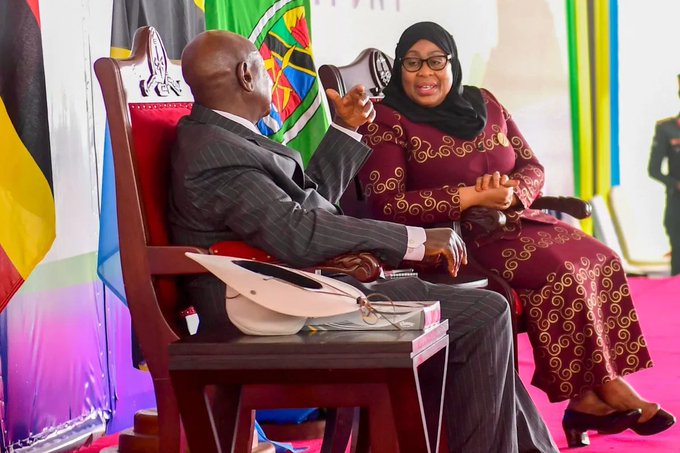President Yoweri Museveni has pledged to engage with his Tanzanian counterpart, Samia Suluhu Hassan, on what he termed as blind non-tariff barriers, which frustrate free trade in the region.
He made the pledge on Friday, December 22, 2023, during an interactive session with the media at State House, Entebbe.
Specifically, the President was responding to a question by journalist Kungu Al-mahadi Adam, who wondered why some Partner States in East African Community (EAC) continue blocking entry of some goods.
“These non-tarrif barriers are really blind. A few years ago, some Ugandan rice growers came to me and said that Tanzania’s rice was outcompeting Ugandan rice in the market. That Tanzania was bringing a lot of rice here and so, they wanted me to block its entry into the country something I refused. I rejected the idea because those are wars of blind people. Doing it would mean that Tanzania will do the same on goods from Uganda and so on. So, when shall we trade together?” asked the President.
He said he couldn’t protect what he described as inefficient Ugandan rice growers because it is not only unfair to Ugandans who are forced to buy rice expensively from local producers yet there is cheaper one from Tanzania, but it also opens unnecessary trade wars with brotherly neighbouring countries.
“I opened, and indeed, when you look at the trade balance between our two countries, it is so much in favour of Tanzania. Uganda has got surplus with all other countries in the region except Tanzania and Kenya, who I hear have also been blocking some goods from Uganda. We (Uganda) refused to block rice from Tanzania, but I hear Tanzania still blocks our goods, but I will engage H.E. Suluhu Hassan, on the same,” noted President Museveni.
Tanzania has been restricting entry of a number of Ugandan goods like sugar from entering its territory. In some cases, authorities in Tanzania stop some goods in their territory from crossing to Uganda. For instance, in June this year, the Government of Tanzania, through its ministry of agriculture, temporarily suspended the issuance of permits to Ugandan traders who export rice and maizeflour from the country.
Tanzania said they were conducting an assessment exercise on seasons, the availability of corn foods, and manufacturing conditions of foods in their country for 2023/2024 financial year.
It was, however, reported that the action by Tanzanian authorities was a non-tariff barrier aimed at pushing Ugandan traders out of business.
President Museveni on Friday revealed that he also has information that some EAC Partner States allow a fixed amount of goods in and out of their countries, saying that is not right in a single market like EAC.
“I hear some (countries) say ‘we are giving you a quota of what you bring’, why do you give me a quota yet this is one market? Let those who can do something more efficiently do it, and we all support them. For example, if Tanzania’s rice is cheaper, let’s all as East Africans buy it, just like how Uganda is doing well in milk, fish, and banana production,” said the President.
As such, the president rallied journalists to utilise their media houses for constructive and developmental purposes, saying that would form a public opinion against selfish interests on integration.
“Radios and other media houses should be talking about important issues like the non-tariff barriers instead of abusing Museveni because that is where your future is. The NRM advised that integration is very vital for your prosperity, but people don’t talk about it; if they don’t abuse Museveni, they are talking about America,” he said.
“You should talk about livelihoods; how do you survive? Those who grow maize, who will buy that maize, milk, and sugar. Then you will build up public opinion in East Africa, which will isolate those who don’t see this, but you don’t talk about it. You talk about other things like European football.”
Museveni makes case for Somalia joining EAC
Journalist Kungu had expressed fear that after Somalia joining EAC, its security problems could be extended to other EAC members.
Kungu argued that although there are many benefits to Somalia joining the EAC, the depth of its security problems raises critical questions about the bloc’s readiness and capacity to ensure peace, security, and regional stability.
He reasoned that Somalia’s admission into EAC would lead to increased movement of Somalia-based insurgents into member countries, an unregulated influx of economic migrants, and smuggling of contraband and arms.
But, in response, the President said that although Somalia has security challenges, the issue of Economic integration is about the common market and Somalia has been having commodities from East African countries even before joining the community thus contributing immensely to the market of East Africa.
The President noted that the EAC will be able to deal with the insecurity of the newest member of the community.
“If that is the case, why not formalise it? And the issue of insecurity, we shall handle it, but meanwhile, trade is also going on because even within the war, goods are moving.”

